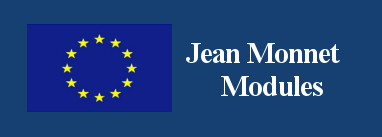

 Web Content Display
Web Content Display
Web Content Display
Web Content Display
 Breadcrumb
Breadcrumb
Breadcrumb
Breadcrumb
 Navigation
Navigation
Navigation
Navigation
 Web Content Display
Web Content Display
Web Content Display
Web Content Display

 Web Content Display
Web Content Display
Web Content Display
Web Content Display

 Web Content Display
Web Content Display
Web Content Display
Web Content Display
For the past decade, the EU has been experiencing a series of internal and external challenges. The economic crisis contributed to the rebirth of nationalisms in Europe which have then been exacerbated by the immigration crisis. This has affected both the public sphere and political discourse and reveals deep divisions concerning the very idea of the European project.
The main aim of this Jean Monnet Module is to provide critical perspectives and knowledge about the internal and external challenges towards the EU. The project is generously supported by Erasmus Plus Programme of the European Union and open to all MA students at Jagiellonian University in Krakow.
The module consists of 2 courses. The first, entitled “Challenges to the European identity. The rebirth of nationalisms in Europe” will be devoted to the problem of the social transformations of European societies which have responded to the crises by rebuilding national boundaries and voting for populist, right-wing parties. The second course, entitled “Political challenges to the European Integration”, will focus on the contestation and legitimisation of the EU political order in both internal and external dimensions. Both courses will be supervised by a senior professor, but the majority of the teaching is delivered by young academics and researchers. Apart from teaching, an Oxford Debate and a workshop will be organised in collaboration with the Europaeum association of leading European universities which will include a roundtable with policy-makers and experts as well students’ group projects.
The uniqueness of the module also lies in the innovative teaching methods (problem-based learning, e-learning tools, development of debating skills, simulations of negotiations). Through participation in the courses and the workshop students will gain knowledge and learn crucial academic skills. Moreover, the module meets a high demand from the international students for courses that tackle the current state of the EU connected to the external and internal strains placed on European integration.
Additionally, Polish national debates and the educational offer of our Faculty lack a critical perspective on current challenges to European integration, we therefore propose a module, which will develop argumentation skills, consensus-building capacity, problem-solving, public speaking and teach students how those skills may be used in solving political and social problems characteristic of contemporary Europe. Its aim is to make students understand that even though Europe is exposed to otherness and insecurity, it is possible to face those problems without hiding behind nationalist and xenophobic walls. The module will thus not only extend our educational offer but will also render its participants subjects rather than objects of European politics.
The main output of the module is the participants’ deeper knowledge about various factors influencing the challenges faced by the EU. Moreover, the module will bridge the curriculum gap and widen our educational offer to the international and Polish students from all over the University. The mid-term outcome is a rise in academic and non-academic skills among the participants, which would make them more competitive in the job market or facilitate their academic education to the PhD level. After completion of the courses, the students will also be better prepared for writing their MA theses. For the young teachers, the module provides an invaluable opportunity to teach in an international environment. The long-term impact of the project will be greater awareness of the social and political challenges to the EU. This will be developed among the participants who are likely to be able to either influence a younger generation of students (as members of academic, professional or epistemic communities), or (as future decision-makers) make European policies sensible and respectful towards European values.